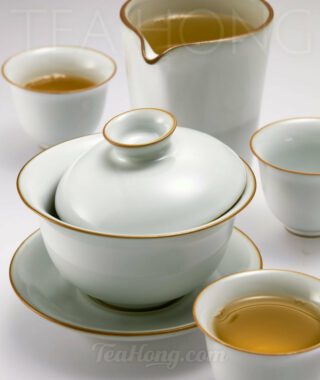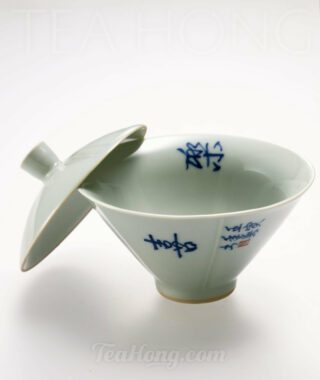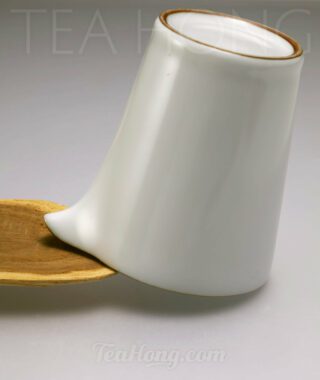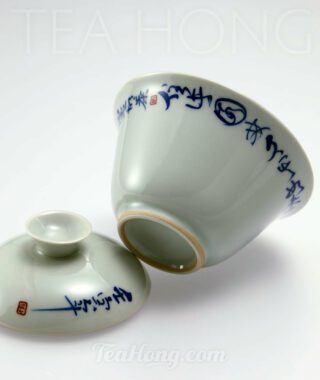-

Moonlight Gaiwan
Gaiwans, Stoneware, Tea Accessories$ 25.90A demanding connoisseur's choice
While to many drinkers, the white porcelain gaiwan maybe the standard infusion vessel, some need an instrument to further improve the brewing experience. It should have all the advantages of a good porcelain — a thin, well formed brim for good decantation, a hollow in the lid button for keeping it cool enough for handling, a dome-shape lid for air trap, a rounded belly for minimising surface area to volume ratio… just like the Celeste Green Gaiwan has. However, one may want additionally a thicker, denser wall in the bowl for even better heat retention, a more solid weight for more confidence in handling, yet the same smooth, polished surface as porcelain for easy care. That would make the perfect gaiwan. Such as this Moonlight gaiwan. A double glazed stoneware of a very dense clay, it weighs 46% more than a porcelain gaiwan of its size. It has a thicker wall at the belly, yet the same thin brim that you expect of a good gaiwan. Its capacity is 150ml, just like an infusion mug specified in the international tasting standard ISO 3103. -

Happiness Gaiwan
Gaiwans, Stoneware, Tea Accessories$ 37.00A small gaiwan for the serious drinker
One issue with smaller gaiwans made from porcelain is the balance of weight while infusing and handling. The lightness in a small volume also means easier heat loss. The use of stoneware alleviate both issues. The brim is made thin, even and firm for easy control when decanting, while the body wall gradually thickens towards the centre for good heat retention. The glass like celadon overglaze makes the vessel as good as porcelain, only with the advantages of a more substantial body. The "Happiness" gaiwan is one of two hand scripted smaller size selections we have picked from Dehua. The two characters for the term "xi le" — happiness — are handwritten separately on the inside and the outside of the gaiwan body. The name of this style of calligraphic script is "Xing Shu" or "Hsing Shu" dependent on which translation system. Or it can be called a semi-cursive script. In dynastic era, it was a non-formal script style used for daily communication but not for formal documents.Rated 5.00 out of 5 -

Moonlight Chahai
Chahai, Stoneware, Tea Accessories$ 15.10A matching chahai for the Moonlight Gaiwan. Or pair it with an infusion vessel of your own choice.
-

Rural Life Gaiwan
Gaiwans, Stoneware, Tea Accessories$ 37.00Celadon overglaze stoneware
One issue with smaller gaiwans made from porcelain is the balance of weight while infusing and handling. The lightness in a small volume also means easier heat loss. The use of stoneware alleviate both issues. The brim is made thin, even and firm for easy control when decanting, while the body wall gradually thickens towards the centre for good heat retention. The glass like celadon overglaze makes the vessel as good as porcelain, only with the advantages of a more substantial body. This "Rural Life" gaiwan is one of two hand scripted smaller size selections we have picked from Dehua. The first four lines from a Tang Dynasty poem "Rural Life" are handwritten on the perimeter of the gaiwan. The style of this calligraphic script is Cao Shu, a cursive script. Some call it running script. It seems that the brush was indeed running when the characters were being brushed on the ceramic biscuit. 茶碗上以草書體寫唐代賈島的一首詩,「郊居即事」的開頭四句:住此園林久,其如未是家。葉書傳野意,檐溜煮胡茶。
Rated 5.00 out of 5
德化
Products > 德化





